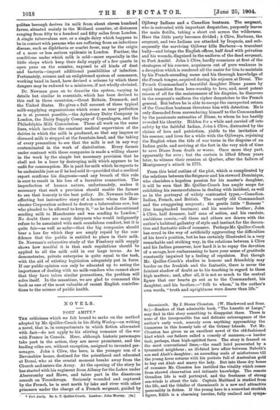THE criticisms which we felt bound to make on the
method adopted by Mr. Quiller-Couch in his Hetty Wesley—on writing a novel, that is, in compartments in which fiction alternated with fact—do not apply to his stirring romance of the war with France in Canada. Here, although historic personages take part in the action, they are never prominent, and the leading roles are, without exception, assigned to invented per- sonages. John h Clive, the hero, is the younger son of a Devonshire house, destined for the priesthood and educated at Douai, who at the crucial moment breaks away from the Church and enters the Army. At the opening of the story he has started with his regiment from Albany for the Lakes under Abercromby and Howe, and takes part in the disastrous assault on Ticonderoga. Seriously wounded and captured by the French, he is sent north by lake and river with other prisoners under the charge of a French sergeant, guided by • • Fort dimity. By A. T. Wier-Conch. London: John Murray. 11.611a Ojibwa), Indians and a Canadian boatman. The sergeant, who is entrusted with important despatches, purposely leaves the main flotilla, taking a short cat across the wilderness. Here the little party becomes divided ; h Clive, Barbour, the sergeant, and two Indians are attacked by Iroquois, and sub- sequently the surviving Ojibway kills Barbour—a truculent bully—and brings the English officer, half dead with privation and his wounds, disguised in the uniform of the dead sergeant, to Fort Amitie. John h Clive, hardly conscipus at first of the stratagem of his rescuer, acquiesces out of pure weakness in a deception which is rendered all the easier for him to maintain by his French-sounding name and his thorough knowledge of the French tongue, acquired during his sojourn at Douai. The French Commandant's beautiful daughter Diane passes by rapid transition from hero-worship to love, and; most potent reason of all for the maintenance of his disguise, he discovers in the sergeant's uniform the cipher despatches to the French general. But before he is able to escape the unexpected return of the Canadian boatman threatens him with detection. He is only dissuaded from surrendering himself to the Commandant by the passionate entreaties of Diane, to whom he has hastily revealed his identity. Hidden for a while and carried off into safety by the faithful Indian, John h Clive, distracted by the claims of love and patriotism, yields to the invitation of his rescuer, and lives for a while with the Ojibways, rejoining the English when the tide of war turns in the disguise of an Indian guide, and arriving at the fort in the very nick of time to save Diane from death or worse. Once more they part, apparently for ever ; but the curtain is lifted fifteen years later, to witness their reunion at Quebec, after the failure of Montgomery's attack in 1775.
From this brief outline of the plot, which is complicated by the relations between the Seigneur and his steward Dominique, who cherishes a hopeless passion for his master's daughter, it will be seen that Mr. Quiller-Couch has ample scope for exhibiting his resourcefulness in dealing with incident, as well as in the portrayal of widely contrasted typee,—Canadian, Indian, French, and British. The courtly old Commandant and the swaggering sergeant ; the gentle little " Bateese " (the humpbacked boatman) and his sombre brother; John it Clive, half dreamer, half man of action, and his resolute, ambitious cousin,—all these and others are drawn with the author's habitual gallantry of style and instinct for the decora- tive and fantastic side of romance. Perhaps Mr. Quiller-Couch has erred in the way of artificially aggravating the difficulties of his hero's position, but he has certainly illustrated in a very remarkable and striking way, in the relations between a Clive and his Indian preserver, how hard it is to repay the devotion of a savage, how embarrassing to have your sense of gratitude constantly impaired by a feeling of repulsion. But though Mr. Quiller-Couch's studies in honour and friendship may border on the freakish and the fantastic, there is never the faintest shadow of doubt as to his teaching in regard to these high matters ; and, after all, it is not so much to the central figure that our hearts go out as to the Commandant, his daughter, and his brother,—" folk to whom," in the author's own words, "truth and uprightness were dearer than life."


























































 Previous page
Previous page